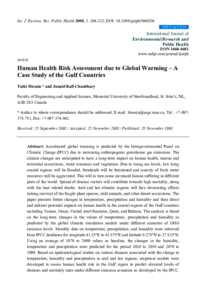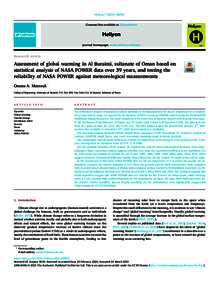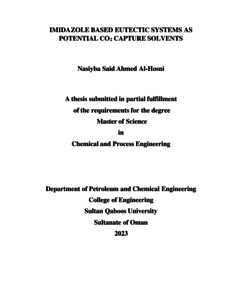Document
Human health risk assessment due to global warming : a case study of the gulf countries.
Identifier
DOI: 10.3390/ijerph5040204
Source
International Journal of Environmental Research and Public Health. V. 5, 4, P. 204-212
Contributors
Chaudhary, Junaid Rafi., Author
Country
Switzerland
City
Basel
Publisher
MDPI.
Gregorian
2008-12-01
Language
English
Subject
English abstract
Accelerated global warming is predicted by the Intergovernmental Panel on Climatic Change (IPCC) due to increasing anthropogenic greenhouse gas emissions. The climate changes are anticipated to have a long-term impact on human health, marine and terrestrial ecosystems, water resources and vegetation. Due to rising sea levels, low lying coastal regions will be flooded, farmlands will be threatened and scarcity of fresh water resources will be aggravated. This will in turn cause increased human suffering in different parts of the world. Spread of disease vectors will contribute towards high mortality, along with the heat related deaths. Arid and hot climatic regions will face devastating effects risking survival of the fragile plant species, wild animals, and other desert ecosystems. The paper presents future changes in temperature, precipitation and humidity and their direct and indirect potential impacts on human health in the coastal regions of the Gulf countries including Yemen, Oman, United Arab Emirates, Qatar, and Bahrain. The analysis is based on the long-term changes in the values of temperature, precipitation and humidity as predicted by the global climatic simulation models under different scenarios of GHG emission levels. Monthly data on temperature, precipitation, and humidity were retrieved from IPCC databases for longitude 41.25°E to 61.875°E and latitude 9.278°N to 27.833°N. Using an average of 1970 to 2000 values as baseline, the changes in the humidity, temperature and precipitation were predicted for the period 2020 to 2050 and 2070 to 2099. Based on epidemiological studies on various diseases associated with the change in temperature, humidity and precipitation in arid and hot regions, empirical models were developed to assess human health risk in the Gulf region to predict elevated levels of diseases and mortality rates under different emission scenarios as developed by the IPCC. The preliminary assessment indicates increased mortality rates due to cardiovascular and respiratory illnesses, thermal stress, and increased frequency of infectious vector borne diseases in the region between 2070 and 2099.
Description
International Journal of Environmental Research and Public Health
Volume 5, Issue 4, December 2008, Pages 204-212
Volume 5, Issue 4, December 2008, Pages 204-212
ISSN
1660-4601
Category
Journal articles





